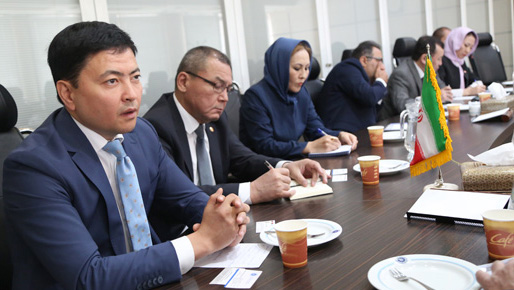Iran and the Eurasian Economic Union are planning to establish a joint council of their chambers of commerce in a bid to facilitate trade after Tehran ratifies the Free Trade Zone agreement.
“Creating a joint council of the chambers of commerce between five Eurasian Economic Union member states and Iran is necessary for the strengthening of relations between us,” said Danil Ibrayev Eurasian Economic Union Trade Council member on Tuesday in a meeting with Mohammad Reza Karbasi Deputy for International Affairs at Iran Chamber of Commerce, Industries, Mines, Agriculture (ICCIMA).
Karbasi noted that such a joint council can help facilitate trade between the five-member union and Iran.
The Eurasian Economic Union (EAEU), comprised of Russia, Belarus, Kazakhstan, Kyrgyzstan and Armenia agreed to create a free trade zone (FTZ) with Iran last May. Later in November, Russian President Vladimir Putin, as head of the body, ratified the decision.
It allows Iran entrance into the free trade zone during a 3-year trial period and gives it unlimited access to the five countries’ markets.
One of the main features of this deal is that Iranian businesses can export their goods under “very low tariffs” to the Eurasian Union. Citrus such as apple, cultivated abundantly across Iran, will be one of those agricultural products that will make their way to the Union countries benefiting from the low tariffs. Dairy, food, fruit and industrial products will be other items on the list.
“Iran can turn into a great trade partner with the Eurasian Economic Union and we can move forward in strengthening our relations despite the jealousy of some countries,” Ibrayev mentioned.

Danil Ibrayev Eurasian Economic Union Trade Council member holds talks with ICCIMA Deputy for International Affairs Mohamamd Reza Karbasi, not seen in the pic (Credit: Iran Chamber Newsroom, Bahareh Taghi Abadi)
Karbasi believes the list should include more goods, saying “such a move will create more opportunities between Iran and the Eurasian Economic Union”.
He also proposed that each country present their own exportable goods during an international trade fair. “There are already 200 Iranian businesses that are ready to start their trade with Central Asia under the agreement,” Karbasi said.
Sucha an FTZ can also pave the way for more cooperation between India and the EAEU as Iran is the transit hub for the export of Indian goods to Central Asia, according to the ICCIMA deputy for international affairs.
He mentioned that Iran can engage with the union in trade through their national currencies in a bid to circumvent dollar. Tehran has established payment channel with countries such as India and Iraq in a bid not to use dollar in their trade following the US sanctions.
Ibrayev says the there should be an electronic platform in a bid to study how to trade skirting the US dollar.
He also noted that establishment of direct flights between Tehran and Bishkek, the Kyrgyz capital can also foster more trade relations between the two countries that will enter a FTZ agrrement.
The Kyrgyz businessman also stressed that should more trade be facilitated, Iran and the Eurasian Economic Union have to establish joint laboratories and standard institutes to issue joint certificate for the exported goods.
An Iranian government bill to allow the creation a free trade zone between Iran and the Eurasian Economic Union was cleared at a parliamentary commission early March, driving it a step closer to a final approval by lawmakers.
“The bill on preliminary agreement on the creation of a free trade zone between Iran and the Eurasian Economic Union was studied at the commission in the presence of Energy Minister [Reza Ardakanian] and later approved by the parliament’s National Security and Foreign Policy Commission,” said Ali Najafi Khoshrudi, a spokesman for the commission on 4 March.